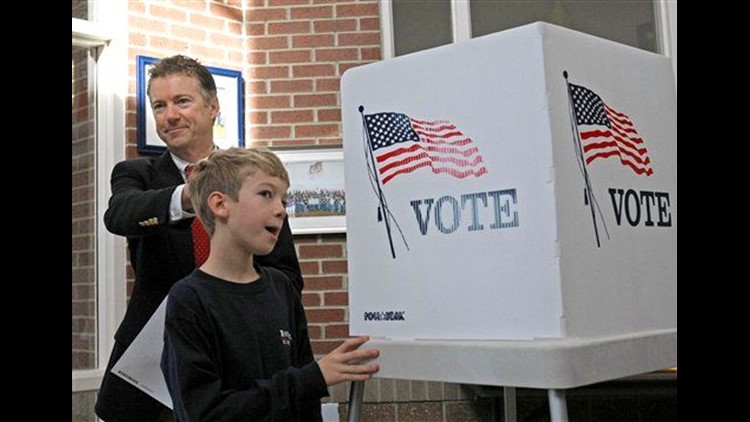WASHINGTON (AP) — The tea party sent two of its favorite sons to the Senate with decisive victories for Rand Paul and Marco Rubio, stoking hopes that their strong conservative and anti-government views will help lead a shake-up on Capitol Hill.
The victories for Paul in Kentucky and Rubio in Florida gave tea party activists two voices in Congress' upper chamber and two Cinderella stories for the 2010 campaign. Both were long shots when they declared their candidacies — Paul a first-time candidate and Rubio the former speaker of the Florida House — but they won over voters with their Washington outsider, anti-tax campaigns.
The question for Election Day was whether the tea party candidates would end up hurting the Republican Party more than they helped it by putting some less viable candidates up for office. That appeared to be the case in Delaware, where tea party darling Christine O'Donnell was trounced by Democrat Chris Coons in the Senate race and tea party candidate Glen Urquhart lost a Republican-held House district to Democrat John Carney.
Rubio, the son of Cuban exiles, and Paul, the son of libertarian hero Rep. Ron Paul of Texas, were elected to seats held by Republicans so they did not contribute to GOP hopes for gains in the Senate.
Candidates with tea party support were on the ballot in more than 70 House districts, seven races for Senate and three for governor. Among the winners in the House was Marlin Stutzman, a state lawmaker in Indiana whose political career predated the tea party but said the traditional GOP should work with the movement to push conservative values.
The grassroots tea party movement, without any official platform or national organization, drew a committed following. About four in 10 voters considered themselves tea party supporters, according to preliminary exit poll results. It was an impressive feat for a movement that didn't even exist in the last congressional election, two years ago.
But the tea party also was a polarizing force among some voters — about a quarter of voters said they considered their vote a message of support for the tea party and nearly as many said their vote was meant to signal opposition to the movement. About half said the tea party wasn't a factor.
Many tea party candidates were running for the first time but still able to defeat opponents with Republican establishment backing in the primaries, including Senate GOP nominees Paul, Sharron Angle in Nevada and Christine O'Donnell in Delaware.
Tea party activists warned their elected representatives, including their champion Paul, not to forget their anti-Washington ideals once they get to Capitol Hill.
"In the months and years to come, we'll be sure to hold Sen.-elect Paul accountable to principles he campaigned on, but tonight, we celebrate with him," said former House Majority Leader Dick Armey, leader of the tea party training group FreedomWorks.
The movement's candidates had no unified agenda, but often pushed for a balanced budget, elimination of the federal debt, repeal of the health care law and strict interpretation of the Constitution. The AP's polling analysis found nearly all tea party supporters wanted to repeal health care and felt President Barack Obama's policies hurt the country. Only about a quarter of non-tea party supporters felt that way.
Politically, tea partyers vowed to turn the Republican Party toward conservatism. Some Republicans warned the movement could give Democrats an opportunity for electoral victories by running too far to the right. In some cases — such as Senate races in Florida and Alaska — tea party candidates sparked a three-way race.
Tea party candidates weren't always easy to identify since the movement is a network of loosely connected community groups — not an established political party with official nominees. Even within the tea party there often was disagreement among rival groups about the legitimacy of candidates claiming tea party credentials.
In identifying candidates, The Associated Press assessed factors including a candidate's history with the movement, the involvement of local leaders and activists in a campaign, endorsements or support from tea party-affiliated groups and whether a candidate is running on a platform that dovetails with the movement's agenda.
Copyright 2010 The Associated Press.



